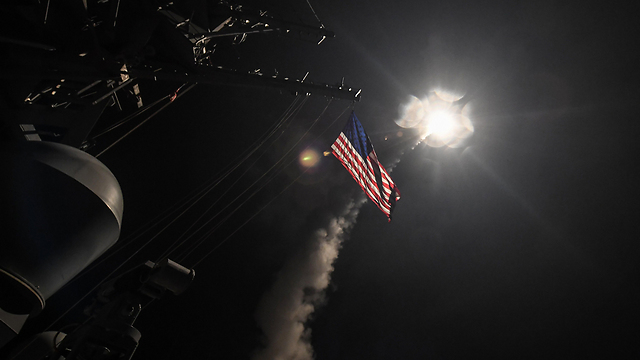
Assad and Trump
צילום: AP
If the US leaves Syria, that is bad news for Israel
Analysis: With the entrenchment of Iran inside Syria, the US and Israel must work closer than ever before in order to disrupt the balance of terror. The problem is that the US seems less than willing to dig their heels in and push back.
Disturbing events are underway in Syria, which will pose a growing threat to Israel's security - unless things turn around.
In the past, there was talk of finding a federal solution for Syria that would be brokered by the superpowers. The problem is that the US had abandoned the Syrian arena, leaving the entire area to Russia's whims.
Syria does not appear to really interest Washington, and Moscow has become the area's 'landlord.' This is bad news for Israel, because Russia is currently assisting its real allies in the Middle East, who happen to be Israel's most dangerous enemies: Iran, Hezbollah, and the Assad regime that depends on them for its survival.
The Russia-Iran-Hezbollah-Assad combination is a danger that cannot be ignored, as it is opening a second northern front against Israel.
In the past, Israel and the Assad regime were locked in a 'balance of terror' situation, leaving the Golan Heights quiet for decades. This balance has been undermined by the arrival of a new axis to support Assad.
Now that the US has, to all intents and purposes, left the Syrian story, Israel's interests are represented by no one but itself.
Israel has no real influence in Syria, and Moscow is not particularly interested in Israel's concerns. Russia has its own perspective on events in the region.
The Iranian-led axis can be expected to avoid creating provocations against Israel for the time being, and focus on consolidating its presence in Syria.
It could use this time to create a well-developed weapons industry, and move its forces into southern Syria. Then, when the time comes, the Iranian axis could face Israel from two directions: Syria and Lebanon. This would make life much harder for Israel.
Israel, for its part, must signal that it will not tolerate such developments. Its reported strike in September against the CERS Syrian weapons center near Damascus, where chemical and biological weapons are developed, as well as powerful ballistic missiles, is a good way to transmit this message. Beyond the tactical advantages of such a strike, there is also a strategic message here: Israel will not be intimidated into avoiding strikes when Jerusalem's red lines have been breached.
Nevertheless, the Israel Air Force could find itself facing advanced Russian-made air defense systems in the future, if Moscow decides to activate these, or allow the Assad regime to do so.
In addition, when one sends messages via weapons, it's not completely clear what the enemy receives and understands. Israel will need to be consistent on this front, while also continuing to walk a tightrope, by avoiding steps that spark an undesired war.
In the meantime, the Iranian-Hezbollah axis looks set on continuing to manufacture and smuggle weapons, despite being 'hit on the nose' every once in a while. For every alleged successful Israeli effort to thwart the weapons flow, there are additional weapons transfers that Israel could not stop.
The big picture is that Iran, Hezbollah, Assad, and Russia are winning the war in Syria. Their morale is high, and their appetite could increase.
Israel's interest, at this stage, is to disrupt and counterbalance the 'balance of terror' together with the US. Without American cooperation, this will be very hard to accomplish.
It is critical for Israel that the US does not leave Syria before this issue is addressed.
If the Iranian-led axis is left unchecked, it will continue to create facts on the ground, and as soon as it is strong enough, it will launch a provocation against Israel. When Israel retaliates, the Iranian axis will be able to respond effectively. Until then, the focus of Iran and Hezbollah will be to build up their capabilities in Syria.
Israel can be expected to act smartly in places where these capabilities constitute a concern.
Ultimately, these events signal that Israel and Iran are engaged in a cold war; a war of minds and interests on Syrian soil.
The Iranians aren't about to exit Syria. They have invested too much money, time, and blood.
Israel's interest is, at this stage, to have a zone stretching from the Da'ara Road in south Syria to Damascus that is completely free of Hezbollah and Iranian forces and operations.
That, together with preventing the development of an advanced weapons industry on Syrian soil, forms the top priority Israeli interests.
The vital thing going forward is to have the Americans on board, and to ensure that when Israel's red lines are violated, Jerusalem acts.
The opinions expressed in this article are the author's own and do not reflect the view of Ynetnews or any of its affiliate publications.













